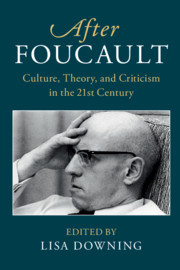Book contents
7 - Foucault, Race, and Racism
from Part II - Coming After Foucault
Published online by Cambridge University Press: 30 May 2018
Summary
It is generally recognized today that no scientific definition of race is possible.
W. E. B. Du Bois, The NegroWhat in fact is racism? It is primarily a way of introducing a break into the domain of life that is under power's control: the break between what must live and what must die.
Foucault, ‘Society Must Be Defended’When it comes to Foucault and questions of race, the critical challenge to date seems to be the ready reproach of Eurocentrism – the charge that Foucault's perspectives, derived as they are from close studies of European cultures and histories, stand negligent of other parts of the modern world. In particular, the disciplinary institutions in Europe that he analyzes with such brilliance were, chronologically speaking, evolving during the very period when European nations aggressively pursued their imperial enterprises overseas, but Foucault has not offered any analysis of such enterprises. Even as he helped popularize the important concept of heterotopia, then, Foucault has been found guilty of not being heterotopic enough. This chapter is an attempt to argue the relevance of Foucault's work to the study of race in a different manner from this justifiable, though in my view not necessarily productive, approach.
Foucauldian Discourse and Its Post-Colonial Inflection
In his critique of European imperialism, Edward Said, greatly influenced by Foucault's early work on discourse, performs the trend-setting task of mapping the systemic and structural correlations between textual formations and economical-political formations. Said's Orientalism argues that these correlations constitute a kind of material history – one based as much on representational traditions as it is on empirical invasions and annexations, a history that has contributed to the construction of the Orient as a distinct entity from the Western world and inferior to it. From the standpoint of race, Foucault's imprints on Said's seminal work are less a matter of the objects of study chosen (the texts that make reference to oriental identities and cultures) than a new, reflexive way of conceptualizing the colonial situation and its aftermath.
- Type
- Chapter
- Information
- After FoucaultCulture, Theory, and Criticism in the 21st Century, pp. 107 - 121Publisher: Cambridge University PressPrint publication year: 2018
- 1
- Cited by

